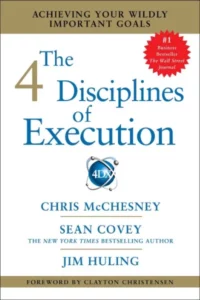Everybody wants to do a great job.
Some individuals, teams, and organizations are better at it than others. Why do some companies excel at everything they do, while others get caught up in the whirldwind of everyday monotony? Chris McChesney, Sean Covey, and Jim Huling have identified the four disciplines that separate the great companies from the meh companies.
- Focus on one (maybe two) Wildly Important Goals (WIGs) to rally behind. In the 1950s, one (one!) of NASA’s eight stated goals was to develop “vehicles capable of carrying…living organisms through space”. In 1961, President John F. Kennedy scrapped all that and focused the entire organization on one WIG: putting a man on the moon (and bringing them safely home) by the end of the decade. It energized everyone, right down to the janitors. On July 21, 1969, the world watched Neil Armstrong realize that goal.
- Choose measures that reflect current behavior. These are also known as leading indicators because they tell you where your results are going to go. Take the ubiquitous example of losing weight. Stepping on the scale is a lagging indicator that tells you where you’ve been. At that point, it’s too late to take action. There’s nothing you can do about it. Instead, focus on steps taken and calories consumed. You can set daily targets on those metrics that guide your actions.
- Track performance. We love having feedback, so create a scoreboard that lets every individual contributor, every team, every division, every organization know how they’re doing. Include both leading and lagging indicators. It needs to be easily updated and as close to real-time as possible.
- Establish a culture of accountability. Two things here. First, average teams are accountable to a leader; wildly successful teams are accountable to each other. Yes, you don’t want to let the boss down, but more importantly, you don’t want to let each other down. Second—and I find this the more interesting concept—is the definition of accountability. We usually use accountable to mean “the person who gets in trouble when things go south”. 4DX uses the same definition as The 12-Week Year: “the person responsible for making results happen”.
Out of the whole book, it’s that concept of accountability that I find the most intriguing. Focus on one thing, maybe two? Sure. When everything’s important, nothing is. Use leading indicators? Yep. You’ve got to track something you can act on. Create a scoreboard? Of course. Feedback’s awesome.
I first read 4DX and The 12-Week Year fairly close together, so it really stood out how they both treat the concept of accountability. We usually use a more negative concept that makes us want to avoid accountability—we don’t want to be the one who gets in trouble. But McChesney et al are saying quite the opposite. Accountability is a good thing. It’s proactive. It’s accepting responsibility for the outcome. Can you imagine a team that understands and properly applies accountability? Where everyone is focused on stepping up and getting the job done, instead of avoiding eye contact when the boss is looking for volunteers?
The second half of the book goes on to discuss how to make this happen. This is all easier said than done. You can go off as a leadership team and come up with a brilliant plan, but if you don’t get people to change their behavior, you’re not going to change your results. Your brilliant plan won’t be worth the paper it’s printed on.
It’s a good book, and the concepts are solid. It’s a bit heavy on the corporatespeak, but don’t let that get in your way. As you read, just be thinking about how you’d explain it to your six-year-old.
We’re going to go to Raging Waters next month, but there are some things we need to do first. We’re going to practice swimming the length of grandma’s pool. Every time we go down and back, we’re going put a sticker on this chart. 100 stickers and we’re going on the big water slides. You need to help me remember the stickers, okay?
That’s 4DX.


